
Journal of Settlements and Spatial Planning
Scope & Guideline
Navigating the Intersection of Geography and Development
Introduction
Aims and Scopes
- Spatial Analysis and Planning:
The journal emphasizes the use of spatial analysis techniques, including GIS (Geographic Information Systems) and remote sensing, to study urban and rural planning challenges and solutions. - Socio-Economic Impacts of Urban Development:
Research often explores the socio-economic implications of urbanization, including the impact of industrial clusters, housing policies, and social integration in various communities. - Environmental Sustainability and Resilience:
A core focus is on environmental sustainability, addressing issues such as water management, pollution, and the integration of nature-based solutions in urban planning. - Cultural and Territorial Identity:
The journal examines the role of cultural heritage and territorial identities in shaping urban and rural landscapes, contributing to the discourse on place attachment and community engagement. - Urban Mobility and Safety:
There is a consistent interest in studying urban mobility, traffic safety, and the dynamics of transportation systems in relation to urban development and social equity.
Trending and Emerging
- Digital and Smart City Policies:
Recent publications highlight the increasing importance of digital technologies and smart city initiatives, exploring how these can enhance urban governance and improve the quality of life for residents. - Climate Change Adaptation in Urban Planning:
There is a growing focus on integrating climate change considerations into urban planning, with research addressing resilience strategies and sustainable development practices in the face of environmental challenges. - Social Equity and Urban Mobility:
Emerging research is increasingly concerned with the social dimensions of urban mobility, particularly regarding the safety and accessibility of transport systems for marginalized communities. - Geospatial Techniques in Environmental Management:
The use of advanced geospatial techniques for environmental management and sustainable resource utilization is on the rise, demonstrating the journal's commitment to addressing pressing environmental issues through innovative methodologies. - Community Engagement and Participatory Planning:
There is a trend towards emphasizing community involvement in planning processes, with studies focusing on participatory approaches that empower local populations in decision-making related to urban and rural development.
Declining or Waning
- Traditional Urban Planning Practices:
There is a noticeable reduction in research focusing on conventional urban planning methods, as the journal shifts towards innovative and integrative approaches that incorporate technology and participatory frameworks. - Rural Development Strategies:
While rural development remains a topic of interest, the specific focus on traditional rural planning strategies appears to be declining, with more emphasis placed on urban-centric studies and the integration of rural-urban linkages. - Historical Urban Studies:
Research focusing on historical perspectives of urban development is becoming less prominent, as contemporary issues related to urbanization and socio-economic challenges take precedence.
Similar Journals
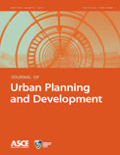
JOURNAL OF URBAN PLANNING AND DEVELOPMENT
Fostering Sustainable Growth in Urban Landscapes.The JOURNAL OF URBAN PLANNING AND DEVELOPMENT, published by the ASCE-AMER SOC CIVIL ENGINEERS, stands as a pivotal platform in the realms of urban studies, civil and structural engineering, and development. With an ISSN of 0733-9488 and E-ISSN of 1943-5444, this journal aims to disseminate high-quality research addressing critical urban planning challenges, fostering innovative solutions, and contributing to sustainable development practices. Spanning from its inception in 1979 to the anticipated issues up to 2024, the journal proudly occupies the Q2 category across multiple disciplines, including Civil and Structural Engineering, Development, Geography, Planning and Development, and Urban Studies. Its noteworthy Scopus rankings reflect its influence, notably being positioned in the 76th percentile in Urban Studies. With no open access options currently available, the journal remains a selective forum for scholarly discourse, attracting researchers, professionals, and students eager to engage with cutting-edge developments in urban planning and design.

disP
Advancing Knowledge in Spatial DevelopmentdisP is a premier journal dedicated to the interdisciplinary field of geographical planning and development, published by Routledge Journals, Taylor & Francis Ltd. With a focus spanning from 1980 to 2024, this esteemed publication serves as a crucial platform for sharing innovative research and insights that address pressing spatial challenges and planning methodologies. The journal is recognized for its significant contribution to academia, currently positioned in the Q2 category within Geography, Planning and Development according to the 2023 rankings. It occupies a noteworthy rank of #423 out of 821 in the Scopus database, placing it in the 48th percentile for social sciences within its category. Although it does not offer open access, disP remains an essential source for scholars, practitioners, and policymakers seeking to deepen their understanding of complex development issues and spatial strategies. Its commitment to excellence in research ensures that disP continues to be an influential voice in shaping the future of geographical planning and development.
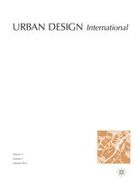
Urban Design International
Shaping cities through interdisciplinary collaboration.Urban Design International, published by Palgrave Macmillan Ltd, stands as a pivotal journal in the fields of Urban Studies and Geography, Planning and Development. Since its inception in 1996, this UK-based journal has become a leading platform for innovative research and discourse, maintaining a Q1 classification in Urban Studies and a Q2 ranking in Geography, Planning and Development as of 2023. With an impressive Scopus ranking of 48 out of 279 in Urban Studies, the journal's contributions are recognized globally, evidenced by its 82nd percentile standing. While currently not an open-access publication, it provides a vital resource for academics, urban planners, and policymakers engaging with the complexities of urban environments. With an aim to foster interdisciplinary collaboration and critical analysis of urban design practices, Urban Design International is committed to pushing the boundaries of knowledge in sustainable urban development and design.
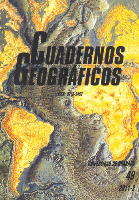
Cuadernos Geograficos
Championing open access for impactful geographical research.Cuadernos Geograficos is a distinguished open access journal published by UNIV GRANADA in Spain, dedicated to advancing the fields of geography, planning, and earth-surface processes. With an ISSN of 0210-5462 and E-ISSN 2340-0129, this journal has been serving as an essential platform for scholars since its inception in 1983. By providing rigorous peer-reviewed research, Cuadernos Geograficos contributes significantly to the academic discourse within these disciplines, holding a respectable position in the Q3 category for both Earth-Surface Processes and Geography, Planning, and Development as of 2023. The journal is indexed in Scopus, ranking #431/821 in Social Sciences and #100/179 in Earth and Planetary Sciences, affirming its relevance and impact within the scholarly community. With its commitment to open access since 1999, Cuadernos Geograficos ensures that vital research is accessible to a diverse audience of researchers, professionals, and students, fostering knowledge sharing and collaborative advancements in the geographical sciences.

Revue Internationale de Geomatique
Connecting Disciplines Through Geospatial InnovationRevue Internationale de Geomatique (ISSN: 1260-5875, E-ISSN: 2116-7060) is a prestigious journal published by TECH SCIENCE PRESS, dedicated to advancing the field of geomatics. This journal serves as a vital platform for disseminating significant research findings, cutting-edge methodologies, and innovative applications within the realm of spatial data and technology. With an emphasis on interdisciplinary studies, it fosters collaboration among researchers, professionals, and students across various domains, including environmental science, urban planning, and geographic information systems (GIS). Although not an open-access journal, Revue Internationale de Geomatique maintains a rigorous peer-review process ensuring the publication of high-quality articles that contribute to the evolving landscape of geomatics. Given its relevance and commitment to scholarly excellence, this journal is a crucial resource for advancing knowledge and practices in the ever-growing field of spatial information science.
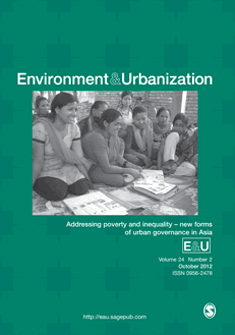
ENVIRONMENT AND URBANIZATION
Pioneering research for resilient and livable cities.Environment and Urbanization is a leading interdisciplinary journal published by SAGE Publications Ltd, dedicated to advancing knowledge in the fields of Environmental Science and Urban Studies. With a strong focus on the interactions between urban environments and ecological systems, this journal has established itself as a pivotal resource for researchers, professionals, and students interested in sustainable urban development and environmental management. Since its inception in 1989, Environment and Urbanization has continually provided high-quality, peer-reviewed articles that foster a deeper understanding of contemporary urban challenges, making it a highly cited publication with an impressive impact factor. As evidenced by its Q1 ranking in both Environmental Science (miscellaneous) and Urban Studies for 2023, the journal stands at the forefront of research, boasting notable Scopus rankings in its fields. By remaining committed to publishing cutting-edge research, the journal aims to influence policy and practice across the globe, ultimately aiding in the creation of more resilient and livable urban areas.

Planlama-Planning
Connecting Ideas for Tomorrow's Urban LandscapesPlanlama-Planning is a distinguished journal published by KARE PUBL, dedicated to the evolving field of urban and regional planning. With its ISSN 1300-7319, it provides a platform for researchers, practitioners, and students to share innovative research and comprehensive reviews on critical planning issues and methodologies. Situated in Istanbul, Turkiye, the journal aims to facilitate discussions that address contemporary challenges in planning and promote sustainable development. Although currently not an open-access journal, it upholds rigorous peer-review standards to ensure high-quality publications. With a commitment to advancing knowledge and fostering collaboration across disciplines, Planlama-Planning stands as a crucial resource for those engaged in shaping cities and communities worldwide.
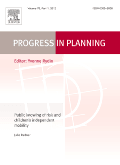
PROGRESS IN PLANNING
Advancing the Frontiers of Urban KnowledgePROGRESS IN PLANNING is a premier academic journal published by PERGAMON-ELSEVIER SCIENCE LTD, renowned for its impactful contributions to the fields of geography, urban planning, and development. With an impressive impact factor situating it in the Q1 quartile of its category for 2023, this journal ranks a notable #38 out of 821 in the Scopus listings, placing it in the 95th percentile within the realm of social sciences. Since its inception in 1973, the journal has established itself as a critical platform for the dissemination of innovative research and practical insights, fostering a deeper understanding of contemporary urban challenges and planning strategies. Although currently not offering open access, PROGRESS IN PLANNING continues to attract a diverse array of submissions, providing a vital resource for researchers, professionals, and students seeking to advance their knowledge and contribute to the evolution of planning practices worldwide.

Raumforschung und Raumordnung-Spatial Research and Planning
Unlocking the complexities of geography and planning.Raumforschung und Raumordnung - Spatial Research and Planning (ISSN: 0034-0111, E-ISSN: 1869-4179), published by OEKOM VERLAG GMBH, is a prominent scholarly journal based in Germany, focusing on critical issues in spatial research and planning. Established in 1977, this Open Access journal has been providing free access to its content since 1998, allowing researchers, professionals, and students to engage with high-quality studies exploring the intricacies of urban studies, environmental science, and geography. With a notable impact in its field, evidenced by its Q2 ranking in Urban Studies and Q3 rankings in Earth and Planetary Sciences, the journal plays a vital role in fostering interdisciplinary dialogue, advancing knowledge, and influencing policies across various spatial domains. It continues to evolve and adapt, having converged its years of publication effectively, making it a valuable resource for anyone looking to stay informed on the latest trends and research within the realms of spatial planning and environmental analysis.
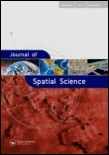
Journal of Spatial Science
Pioneering Research for a Sustainable Spatial FutureThe Journal of Spatial Science, published by Taylor & Francis Ltd, serves as a prominent platform for the dissemination of research in the interdisciplinary fields of geography, atmospheric science, and energy. With an ISSN of 1449-8596 and an E-ISSN of 1836-5655, this journal has established itself as a vital resource since its inception in 2004, boasting an impressive convergence period extending to 2024. Recognized in the Q3 quartile for Atmospheric Science and Energy (miscellaneous), and achieving a Q2 classification in Geography, Planning and Development in 2023, the journal not only reflects the evolving complexities of spatial science but also underscores its increasing relevance in addressing contemporary global challenges. The journal holds a commendable position in Scopus rankings, with notable placements in various categories, further highlighting its academic significance. Researchers, professionals, and students are encouraged to engage with the rich content offered, as the Journal of Spatial Science remains committed to advancing knowledge and fostering discussions pertinent to spatial analysis and its applications.